高中英语必修二unit2教案完整版-推荐下载
- 格式:pdf
- 大小:297.15 KB
- 文档页数:6
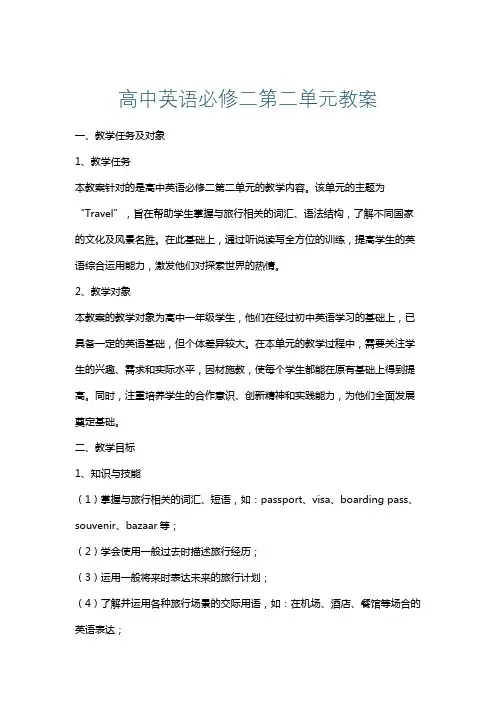
高中英语必修二第二单元教案一、教学任务及对象1、教学任务本教案针对的是高中英语必修二第二单元的教学内容。
该单元的主题为“Travel”,旨在帮助学生掌握与旅行相关的词汇、语法结构,了解不同国家的文化及风景名胜。
在此基础上,通过听说读写全方位的训练,提高学生的英语综合运用能力,激发他们对探索世界的热情。
2、教学对象本教案的教学对象为高中一年级学生,他们在经过初中英语学习的基础上,已具备一定的英语基础,但个体差异较大。
在本单元的教学过程中,需要关注学生的兴趣、需求和实际水平,因材施教,使每个学生都能在原有基础上得到提高。
同时,注重培养学生的合作意识、创新精神和实践能力,为他们全面发展奠定基础。
二、教学目标1、知识与技能(1)掌握与旅行相关的词汇、短语,如:passport、visa、boarding pass、souvenir、bazaar等;(2)学会使用一般过去时描述旅行经历;(3)运用一般将来时表达未来的旅行计划;(4)了解并运用各种旅行场景的交际用语,如:在机场、酒店、餐馆等场合的英语表达;(5)提高英语听力、口语、阅读、写作能力,尤其是描述性写作和叙述性写作能力。
2、过程与方法(1)通过小组合作、讨论、分享等形式,培养学生合作学习的能力;(2)通过听力、口语、阅读、写作等多种教学活动,提高学生英语综合运用能力;(3)运用任务型教学法,引导学生参与各种实践活动,如制定旅行计划、编写旅行日记等;(4)利用多媒体、网络资源等教学手段,拓展学生的知识视野,提高学习兴趣;(5)关注学生个体差异,实施个性化教学,使每个学生都能在原有基础上得到提高。
3、情感,态度与价值观(1)培养学生对英语学习的兴趣,激发他们学习英语的热情;(2)通过了解不同国家的文化及风景名胜,拓展学生的国际视野,增强跨文化交际意识;(3)教育学生尊重、包容不同文化,培养他们的全球观念;(4)引导学生关注环境保护,培养他们的环保意识和责任感;(5)鼓励学生积极参与社会实践,提高他们的团队协作能力和解决问题的能力。
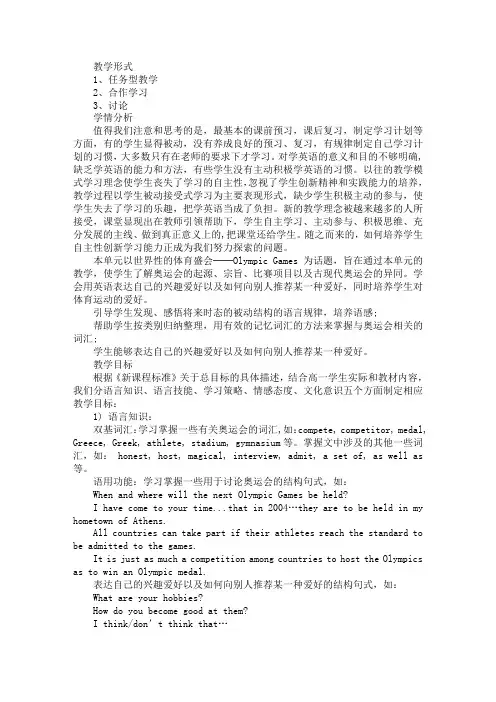
教学形式1、任务型教学2、合作学习3、讨论学情分析值得我们注意和思考的是,最基本的课前预习,课后复习,制定学习计划等方面,有的学生显得被动,没有养成良好的预习、复习,有规律制定自己学习计划的习惯,大多数只有在老师的要求下才学习。
对学英语的意义和目的不够明确,缺乏学英语的能力和方法,有些学生没有主动积极学英语的习惯。
以往的教学模式学习理念使学生丧失了学习的自主性,忽视了学生创新精神和实践能力的培养,教学过程以学生被动接受式学习为主要表现形式,缺少学生积极主动的参与,使学生失去了学习的乐趣,把学英语当成了负担。
新的教学理念被越来越多的人所接受,课堂显现出在教师引领帮助下,学生自主学习、主动参与、积极思维、充分发展的主线、做到真正意义上的,把课堂还给学生。
随之而来的,如何培养学生自主性创新学习能力正成为我们努力探索的问题。
本单元以世界性的体育盛会──Olympic Games 为话题,旨在通过本单元的教学,使学生了解奥运会的起源、宗旨、比赛项目以及古现代奥运会的异同。
学会用英语表达自己的兴趣爱好以及如何向别人推荐某一种爱好,同时培养学生对体育运动的爱好。
引导学生发现、感悟将来时态的被动结构的语言规律,培养语感;帮助学生按类别归纳整理,用有效的记忆词汇的方法来掌握与奥运会相关的词汇;学生能够表达自己的兴趣爱好以及如何向别人推荐某一种爱好。
教学目标根据《新课程标准》关于总目标的具体描述,结合高一学生实际和教材内容,我们分语言知识、语言技能、学习策略、情感态度、文化意识五个方面制定相应教学目标:1) 语言知识:双基词汇:学习掌握一些有关奥运会的词汇,如:compete, competitor, medal, Greece, Greek, athlete, stadium, gymnasium等。
掌握文中涉及的其他一些词汇,如: honest, host, magical, interview, admit, a set of, as well as 等。
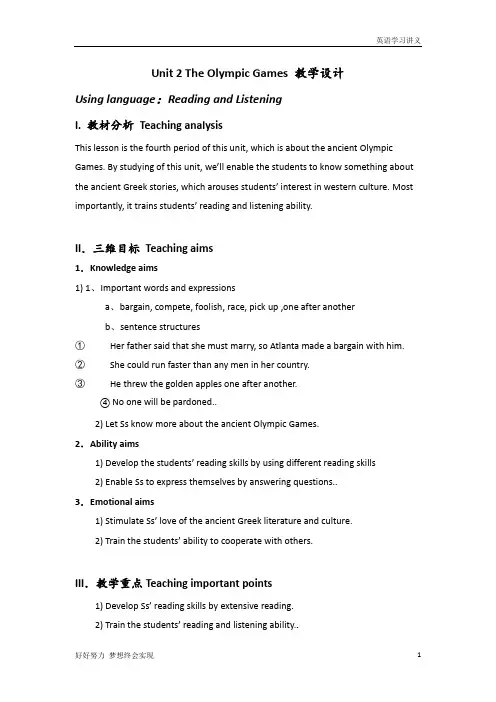
Unit 2 The Olympic Games 教学设计Using language:Reading and ListeningI. 教材分析Teaching analysisThis lesson is the fourth period of this unit, which is about the ancient Olympic Games. By studying of this unit, we’ll enable the students to know something abo ut the ancient Greek stories, which arouses students’ interest in western culture. Most importantly, it trains students’ reading and listening ability.II.三维目标Teaching aims1.Knowledge aims1) 1、Important words and expressionsa、bargain, compete, foolish, race, pick up ,one after anotherb、sentence structures①Her father said that she must marry, so Atlanta made a bargain with him.②She could run faster than any men in her country.③He threw the golden apples one after another.④ No one will be pardoned..2) Let Ss know more about the ancient Olympic Games.2.Ability aims1) Develop the students’ reading skills by using different reading skills2) Enable Ss to express themselves by answering questions..3.Emotional aims1) Stimulate Ss’ love of the anci ent Greek literature and culture.2) Train the students’ ability to cooperate with others.III.教学重点Teaching important points1) Develop Ss’ reading skills by extensive reading.2) Train the students’ reading and listening ability..IV.教学难点Teaching difficult pointEnable Ss to learn to use different reading strategies such as skimming ,scanning and so on.IV. 教学辅助工具Teaching aidsMultimedia, computer and blackboard.V.教学方法Teaching methods1) Task-based teaching and learning2) Cooperative learning 3) DiscussionVI. 教学流程Teaching proceduresStep1. Greeting and Lead-inFirst, show the Ss the two pictures on P14.Have Ss talk about these two pictures T: What can you see in the picture?Can you guess the relationship between them?What is the girl giving to the manSs look at the pictures and then answer the questionsSecond, Group workT: Which is best for describing what happened?1.This story is about a princess who races because she does not want to marry.2.This story is about a princess and a man who agree to marry.3.This story is of how a Goddess helps a man marry a princess.Ss think and talk about it for several minutes then give their answersStep 2. Reading1.ScanningRead the text quickly and find out the answers:. Who was Atlanta?What was she good at?Who did she want to marry?How could Hippomenes win Atlanta?Purpose: To get a brief understanding of the passage.2. SkimmingRead the text again and then do the following true or false questions.1). Atlanta practised running to compete in the Olympic Games.2). At first Hippomenes understood why men ran against Atlanta.3). Atlanta was not sure she would win.4). She was so angry about the fact that she could not run in the Olympics.5). She made as many men as she could share her pain.6). Her father did not understand her wish to compete in the Olympics.7). He did not refuse her wish to choose her husband in a race.Suggested Answers: (1) F (2) F (3) F (4) T (5) T (6) T (7) TPurpose: To get Ss to have some details in the text.Step3 DiscussionAsk Ss to talk about the possible ending in groups of five. After discussing, let every student write down the result they have got. And then ask some Ss to read out their results.Purpose: To make Ss have more chances to practice expressing themselves.Step4 ListeningSs will try to work out the order of the following sentences before listening( )One man wanted to win and marry Atlanta very much.( )Atlanta married him and they lived happily ever after.( )When the race began, Atlanta ran past him.( )He asked the Goddess of Love fro help.( )Atlanta was a very beautiful princess.( )Many men tried to compete with her, but failed and so were killed .( )She stopped to pick them up.( )She gave him three golden apples.( )She ran too slowly and he won.( )He threw the golden apples one after another.( )She could run faster than any man in Greece.Have Ss listen to the tape and finish the exercises 3-5 on P15Then T will check answers with Ss.VII. 家庭作业HomeworkFinish tasks in workbookWrite a short passage entitled “My favourite sport.”VIII. 板书设计Blackboard designUnit 2 The Olympic GamesThe story of AtlantaQuestions:1.Who was Atlanta?2.What was she good at?3.Who did she want to marry?4.How could Hippomenes win Atlanta?。
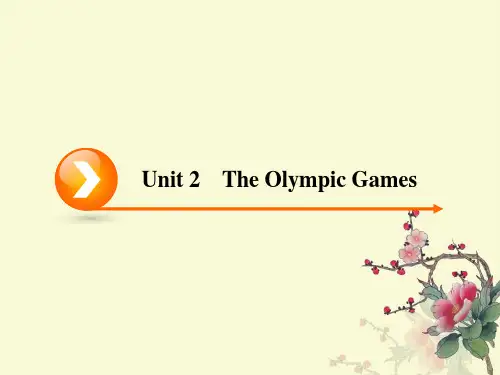
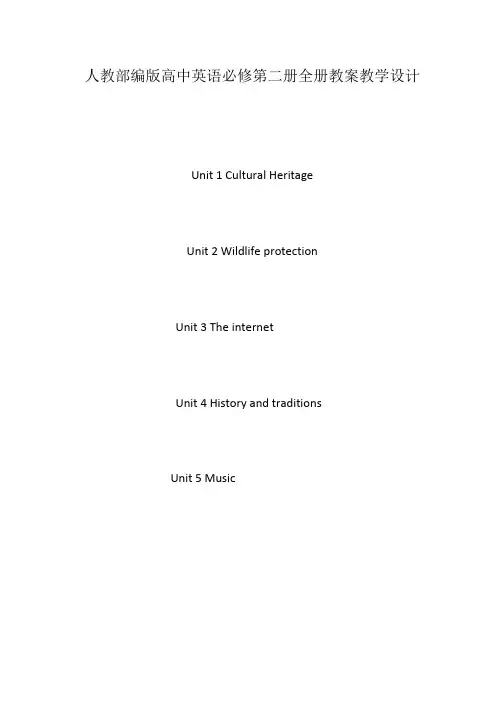
人教部编版高中英语必修第二册全册教案教学设计Unit 1 Cultural HeritageUnit 2 Wildlife protectionUnit 3 The internetUnit 4 History and traditionsUnit 5 MusicUnit 1 Cultural HeritagePeriod 2 Reading and Thinking:From Problems to Solutions【教材分析】1.This section focuses on "Understanding how a problem was solved,,, which is aimed to guide students to analyze and discuss the challenges and problems faced by cultural heritage protection during the construction of Aswan Dam, as well as the solutions. On the basis of understanding, students should pay attention to the key role of international cooperation in solving problems, and attach importance to the balance and coordination between cultural heritage protection and social and economic development. Students are encouraged to face challenges actively, be good at cooperation, and make continuous efforts to find reasonable ways and means to solve problems.【教学目标】1.Enable students to understand the main information and text structure of the reading text;2.Motivate students to use the reading strategy "make a timeline,, according to the appropriate text genre;3.Enable students to understand how a problem was solved;4.Enable students to understand the value of protecting cultural heritage by teamwork and global community;【教学重难点】1.Guide students to pay attention to reading strategies, such as prediction, self-questioning and scanning.2.Help students sort out the topic language about protecting cultural relics and understand the narrative characteristics of "time-event" in illustrative style3.Lead students to understand the value of protecting cultural heritage by teamwork and global community;【教学过程】1.PredictionStep 1 Predicting the main idea of the passageLook at the title and the pictures, and then predict what the passage will be about.Q: What will be talked about?Step 2: Fast reading tasksTask of the first fast reading:Read quickly and figure out the key words of each paragraph.•Paragraph 1: challenge•Paragraph 2: proposal led to protests•Paragraph 3: committee established•Paragraph 4: brought together•Paragraph 5: success•Paragraph 6: spiritTask of the second fast reading:1.Why did the Egyptian government want to build a new dam in the 1950s?2.Why did the building of the dam lead to protests?3.How did the government save the cultural relics?4.Which one can describe the project?A. Successful.B. Negative.C. Useless.D. Doubtful.5.What can be learned from the Aswan Dam project?Step 3: Careful reading tasksRead more carefully and answer the following questions.1.What do "problems" refer to and what do "solutions" refer to?2.Find out the numbers in paragraph four and explain why the author used exact numbers instead of expressions like many?3.What can you infer from "Over the next 20 years, thousands of engineers and workers rescued 22 temples and countless cultural relics"?4.What can you infer from "Fifty countries donated nearly 80 million to the project"?The project cost a lot of money.5.Before the building of the dam, what problems did the Nile River bring to the Egyptian?6.What words can you think of to describe the working process of the project?Step 4: ConsolidationDivide the passage into three parts and get the main idea of each part.Part 1 (Paragraph 1)The introduction of the topicKeeping the right balance between progress and the protection of cultural sites is a big challenge.Part 2 (Paragraphs 2-5)The process of saving cultural relics•Big challenges can sometimes lead to great solutions.•The Egyptian government wanted to build a new dam, which would damage many cultural relics.•The government turned to the UN for help.•Experts made a proposal for how to save cultural relics after a lot of efforts and the work began.•Cultural relics were taken down and moved to a safe place.•Countless c ultural relics were rescued.•The project was a success.Part 3 (Paragraph 6)The summary of the textThe global community can sometimes provide a solution to a difficult problem for a single nation.Step 5: Critical thinking:1.How to deal with the construction and the protection of cultural relics?2.As students, what should we do to protect our cultural relics?Step 6: summaryStep 7 Homework:Review what we have learned and find out the key language points in the text. 板书设计教学反思Unit 2 Wildlife ProtectionReading for Writing【教材分析】The activity theme is "making effective poster,,. The protection of wildlife needs the participation of the whole society. It is imperative to educate the public on wildlife protection and arouse the public's awareness and enthusiasm for wildlife protection. Teenagers are not only the main body of education, but also the "ambassador" of publicity and promotion. To make posters, students need to understand and study the situation of endangered animals and think about protection measures. In the process of reading and understanding the content of posters and making posters, students should be trained to master and use the style of posters, and their social responsibility and sense of responsibility should be cultivated.The reading text is two posters. The first poster, "give ugly a chance!" calls on people to protect all kinds of wild animals and not treat them differently because of personal likes and dislikes. No matter how beautiful or ugly animals are, they have the meaning and value of existence. The world is beautiful because of the diversity of biology. The article uses the tone of statement to make people unconsciously accept the author's point of view. The second POSTER "don't make paper with my home!,, adopts anthropomorphic rhetoric and takes koala's heart cry as the title, criticizing those behaviors of deforestation and destruction of animal homes. The text is a progressive explanation of the title. Exclamatory sentences and rhetorical sentences are used in this paper, which express the author's attitude and point of view. In addition, the title ofthese two posters uses exclamation sentences with strong appeal and emotional color, coupled with vivid pictures, making the posters more powerful.【教学目标】1.Cultivate students to acquire some features about an English poster by reading the text.2.Help students to write an English poster about animal protection properly using some newly acquired writing skills in this period.3.Develop students' writing and cooperating abilities.4.Strengthen students' great interest in writing discourses.【教学重难点】1.Stimulate students to have a good understanding of how to write an English poster properly.2.Cultivate students to write an English poster properly and concisely.【教学过程】Step 1: Lead inDo you want to be a volunteer of a pefs shelter? Why?Yes, I want to be a volunteer of it, because I want to help the pets, which are lovely and cute. I like them very much.Step 2: Read to discover details concerning the main details of the news report.I.Read the news report and then solve the questions below.1.Who started the rescue centre called the Small Friends Pet Shelter?A group of high school students and parents.2.What did the young people do in the shelter?Take care of animals.3.How do the young people think of their work?Worthwhile4.What help does the centre need?Volunteers, time and love.II. Read the text again and then choose the best answer.1.What should we do when we protect the wildlife animals?A.Treat all the wild animals equally.B.Only pay attention to less cute animals.C.Pay attention to cute animals.D.Care about endangered wildlife animals.2.Whafs the bad effect of cutting down billions of trees to make paper for humans?A.Make a lot of animals homeless.B.Make a number of wildlife animals dying out.C.The animals5 habitat is being destroyed.D.All of them.【答案】ADCStep 3: Study the organization and language features.1.Read the passage more carefully and write down the outline of the text.1.The Small Friends Pet Shelter was started by a group of high school students and their parents when they started to see many pets (that were left behind after their families moved away).译文:当一些高中生和他们的父母看到在主人搬走后,时,们建立了小朋友宠物收容所。
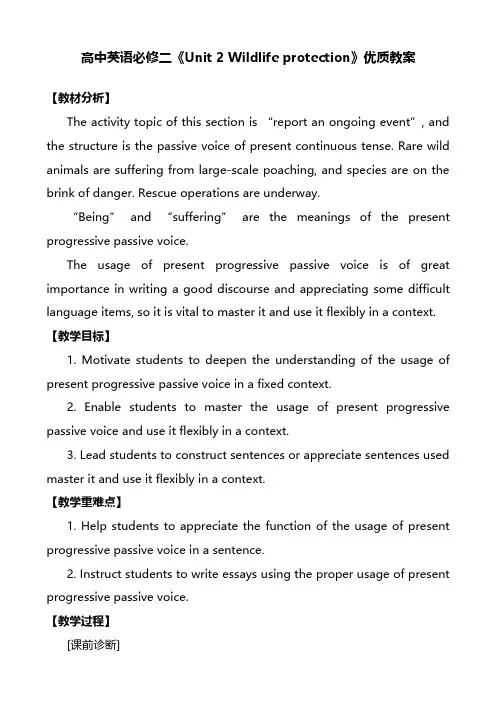
高中英语必修二《Unit 2 Wildlife protection》优质教案【教材分析】The activity topic of this section is “report an ongoing event”, and the structure is the passive voice of present continuous tense. Rare wild animals are suffering from large-scale poaching, and species are on the brink of danger. Rescue operations are underway.“Being” and “suffering” are the meanings of the present progressive passive voice.The usage of present progressive passive voice is of great importance in writing a good discourse and appreciating some difficult language items, so it is vital to master it and use it flexibly in a context.【教学目标】1. Motivate students to deepen the understanding of the usage of present progressive passive voice in a fixed context.2. Enable students to master the usage of present progressive passive voice and use it flexibly in a context.3. Lead students to construct sentences or appreciate sentences used master it and use it flexibly in a context.【教学重难点】1. Help students to appreciate the function of the usage of present progressive passive voice in a sentence.2. Instruct students to write essays using the proper usage of present progressive passive voice.【教学过程】[课前诊断]Look at the picture and tell me what workers are doing. What is the house being done?The workers are building a house.A house is being built by the workers.We’re being killed for the wool beneath our stomachs. And our fur is being used to make sweaters for people like you.We are being hunted for our ivories.Step 1: Read the sentences and sum up the meanings of the Present Continuous Passive Voice.1. Do you know any other endangered wildlife in China that is not being protected?2. We’re being killed for the wool beneath our stomachs.3. Is their fur being used to make sweaters for people like you?4. What good things are being done here to save local wildlife?肯定式:be being doneShe is being treated in China now.否定式:be not being doneMy computer is being repaired now.我的电脑正在修理中。
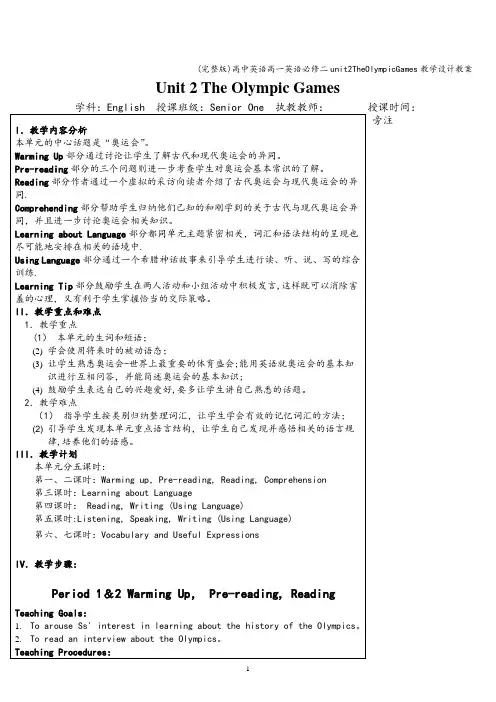
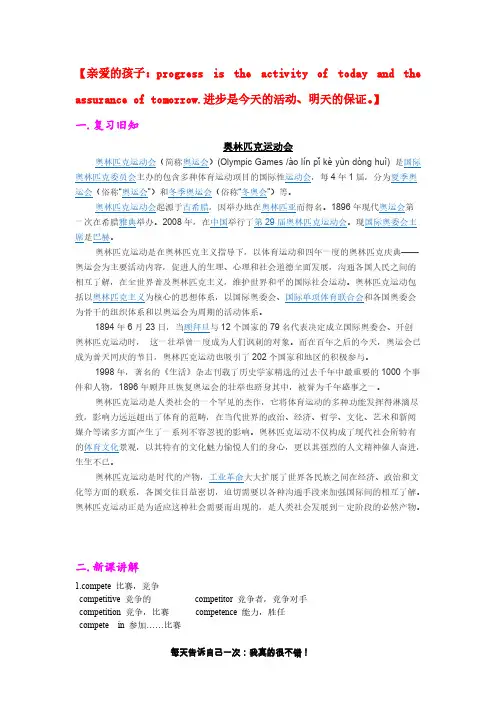
compete for 争取获得compete with /against 同……竞争2.take part in 参加,参与Take an active part inPlay an important part in 扮演重要角色take part in,join ,join in ,attend :take part in 指参加大型活动,join指参加党派,团体,组织等,表示成为其中一员。
与某人一起做某事可以表达为:join sb. in (doing) sth. join in指参加某种活动,游戏,竞赛,娱乐。
attend 指参加会议,婚礼,典礼,上课,上学,听报告等。
3.stand for 代表,象征,表示; 主张,拥护,支持;忍受Stand up 站起来stand out 突出,显眼stand by 袖手旁观stand aside 站在一旁4.admit 准许进入,准许参加,接纳,承认be admitted to/into 被准许进入admit doing/that…承认做了……admit sb./sth. to be /as…承认某人/某物是…5.nor/neither 也不倒装结构nor/neither +助动词/be/情态动词+主语表示某人某物也不……类似于so的用法So+主语+助动词/be/情态动词表示某人某物的确……6.as well 也,又,还as well as 和……一样might/may as well do 我们不妨/还是…吧besides ,in addition to 除……之外还有as well,also,too,either 的区别as well前面不用逗号,放在句尾,用在肯定句,疑问句中also 一般放在be/情态动词/助动词之后,实义动词之前too放在句中或句末,通常用逗号隔开,用于肯定句,疑问句中。
Either 放在句尾7.as…as和……一样第一个as为副词,第二个as为连词,用来连接一个比较状语从句,但常省略与主句相同的成分。
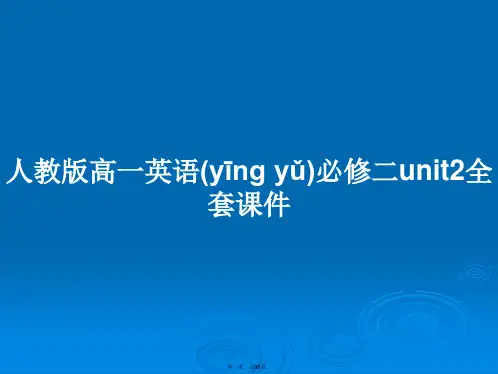
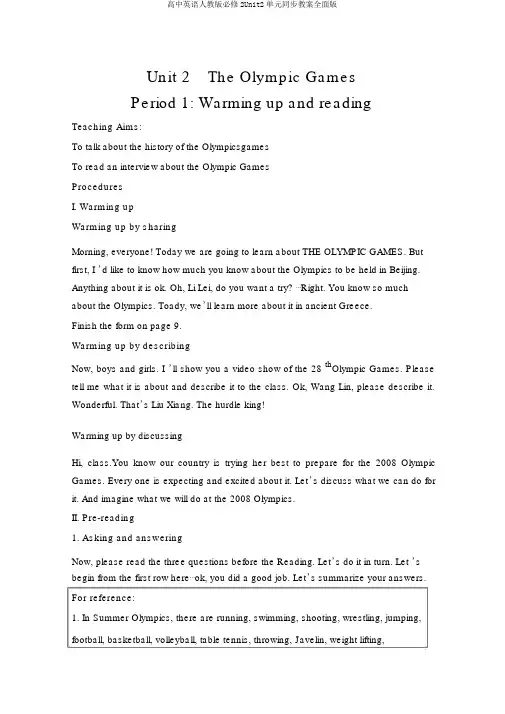
Unit 2The Olympic GamesPeriod 1: Warming up and readingTeaching Aims:To talk about the history of the OlympicsgamesTo read an interview about the Olympic GamesProceduresI. Warming upWarming up by sharingMorning, everyone! Today we are going to learn about THE OLYMPIC GAMES. But first, I ’d like to know how much you know about the Olympics to be held in Beijing. Anything about it is ok. Oh, Li Lei, do you want a try? ⋯Right. You know so much about the Olympics. Toady, we’ll learn more about it in ancient Greece.Finish the form on page 9.Warming up by describingNow, boys and girls. I ’ll show you a video show of the 28 th Olympic Games. Please tell me what it is about and describe it to the class. Ok, Wang Lin, please describe it. Wonderful. That’s Liu Xiang. The hurdle king!Warming up by discussingHi, class.You know our country is trying her best to prepare for the 2008 Olympic Games. Every one is expecting and excited about it. Let’s discuss what we can do for it. And imagine what we will do at the 2008 Olympics.II. Pre-reading1. Asking and answeringNow, please read the three questions before the Reading. Let’s do it in turn. Let ’s begin from the first row here⋯ok, you did a good job. Let’s summarize your answers. For reference:1.In Summer Olympics, there are running, swimming, shooting, wrestling, jumping, football, basketball, volleyball, table tennis, throwing, Javelin, weight lifting,gymnastics, boxing etc.In winter Olympics, there are skiing skating, ice hockey, ski jumping, sledding, snowboarding etc.2.The 29th Olympic Games will be held in Beijing on Auguster 18th, 2008.3.To hold the Olympic Games is a rich prize for a country. And it can make a country known in the world. It can stimulate the country ’s economy, and help to speed up its development.2. Imaging and introducingPlease look at the three pictures in the reading. Please talk about them. Imagine whatever you can.For reference: The first picture is the status of a great Greek. His name is Pausanias. He was a famoustraveler and writer in the second century AD. HisGuide to Greece is an extremely comprehensive guidebook for tourists, concentrating on buildings, tombs and status and including a lot of information on the mythological, religious and historical background to the monuments described. It is so informative that it may be called the foundation of classical archaeology and this ancient Baedeker is still used as a guide to classical Greece. Can you remember a famous ancient Chinese traveler and writer? He also wrote a book. Yes, his name is Xu Shake. His works isThe Notes of Xu Shake’stravels.The second picture is the opening ceremony of the Olympic Games. Maybe this is the principle stadium. It’s large and can hold thousands of audience.The third picture is a Chinese athlete named Yang Yang. She won a gold medalfor China in the 2002 winter Olympic Games. She is a famous skating player.3.Talking and SharingWe know there are many differences and similarities about the ancient and modern Olympics. Do you know anything about them? You can simply guess. Yes, Lucy, try⋯III. Reading1. Reading aloud to the recording and finding the general ideaNow please listen and read aloud to the recording of the text AN INTERVIEW. Payattention to the pronunciation and intonation as well as the pauses within each sentence. Then try to get the general idea of the passage. Have you got the main idea?Yes, it tells us the differences and the similaritiesbetween the ancient and modern Olympics.2. Reading and actingNow let ’s play the parts of the Greek writer Pausanias and the Chinese girl Li Li. Now boys, you are Pausanias; girls, you are Li Li. Please pay attention to the bold words.3. Reading and findingNow read the text again. The boys shall try to finish the task: What was the ancient Olympics like? The girls shall try to finish the task: What is the modern Olympics like?4. Reading and collecting informationOk, now let ’s read it silently. First let ’s talk about the same points between theancient and modern Olympics. Who can answer? Any volunteers?Then let’scome to the differences.The similarities①Both are held every four years.②Both are held not for money but for honour.③The beliefs are the same. They are: Swifter, Higher, and stronger.④Men are allowed to take part both in ancient and modern Olympics.⑤Some events are the same, such as running, jumping, shooting andthowing.The Differences①There were not winter Olympics in the past.②Now competitors are from all over the world. But in the ancient time,only the people in Greece could take part.③Only men were allowed to take part in the past, now woman are alsoallowed.④In the past, winners got the olive wreath as the prize. Nowcompetitors compete for medals.⑤The events and athletes in modern time are more than those in the past.⑥There is a special village for the competitors to live in, a stadium forcompetitions, a gymnasium for these who watch the games now. But therewere not in the past.)5.Reading and underliningNext you are to read and underline all the useful expressions or collocations in the passage. Copy them to your notebook after class as homework.Collocations from AN INTERVIEWtake part in⋯, gold medals, the spirit of⋯, be held, in order to, host the Olympic Games, on a magical journey, find out, the present day Olympic Games, used to, write about⋯, come to your time, be admitted as⋯, two sets of ⋯, enjoy competing in ⋯ , compete against⋯ , for the honour of ⋯, reach the standard, be admitted to⋯, play a very important role, as well as, a stadium for competitions, as a matter of fact, competefor⋯, olive wreath, feel proud of⋯, make⋯ happyⅣClosing downClosing down by doing exerciseTo end the lesson you are to do the comprehending exercises 1 & 2.Closing down by discussingYou know our government has tried its best to compete for hosting the 29thOlympic Games. It has cost a lot of money. Do you think it is worthwhile? Why?For reference:It is worthwhile to host the Olympic Games. To host Olympic Games can make our country known to the whole world. To host Olympic Games can make our cultureand people understood by the other peoples. To host Olympic Games can stimulate the developing of our economy.Closing by imaginingthImagine what we will do and what we can do for the 29 Olympic Games now.For reference: Maybe we can serve as volunteers to help the foreign visitors and athletes from all over the world. So at present we should study hard. Especially we should try our best to learn English well.Closing down by narratingWe can see the text is written in a conversational style. And there are two speakers. Oneis Pausanias, a Greek writer 2000 years ago, the other is Li Li, a Chinese girl. Now let’s change it into a narrative style. In other words, let’s describe the ancient and modern Olympic Games in our own words. Who would like to have a try?For reference:The ancient Olympic Games began in Greece and were held from 776 B.C. to A.D.393. It was held every four years. At that time, there were not so many sports as today. And women were not allowed to take part in the games. There werenot Winter Olympics at that time. Winners got the olive wreath as the prize. Themotto was swifter, higher and stronger.The modern Olympic Games began in 1891. They’re held every four years. Thereare many new sports in the Olympics. In the summer Olympics there are over 250 different sports. Women are not only allowed to join in but also play a very important role. Now the competitors compete for medals. The motto is swifter, higher and stronger.Closing down by summarizingAs we have finished the passagewe’ll sum up what we have learned. First let ’s see the writing skills. It is written in a conversational style. It ’s in a very interesting way. It adopts a dialogue between Pausanias who lived 2000 years ago and a Chinese gird in modern world. Through their dialogue, the differences and similarities between the ancient and modern Olympic Games are made known to the readers. Just because it is in a conversational style, there are quite a few oral spoken English and elliptical phrases. Through the comparison between the ancient and modern Olympic Games, we have learned the differences and the similarities between them. Now we can have a deep understanding of the Games. From the passage, we can have a deep understanding of the Games. From the passage,we can also get to know that the Olympic Games are developing and improving. It ’s our duty to make the Olympic Games better and healthier. We know that one of the slogans for 2008 Beijing Olympic Games is Green Olympic Games. It shows that people are paying more and more attention to our environment.Period 2: Learning about LanguageTeachin Aims:To learn about future passive voiceTo discover useful words and expressionsTo learn the methods of words formationProceduresI. Warming upWarming up by dictatingThere are several important sentences in this unit. Let’s dictate them. If you can’t, learn them by heart after class.①When and where will the next Olympic Games be held?②I live in what you call “Ancient Greece”and / used to write about theOlympic Games more than 2000 years ago.③All countries can take part if they reach the standard to be admitted to thegames.④The next Olympic Games will be held in my hometown.⑤It is just as much a competition among countries to host the Olympics asto win an Olympic medal.Warming up by discovering useful words and expressionsTurn to page 12 and do exercises 1, 2 and 3 first. Check your answers against your classmates’.II.Learning about Present Future Passive VoiceTurn to page 13 and do exercise 1. And tell the class the formation of present future passive voice.For reference:Well done, class. We can follow the following formlation to turn the future tenses into future passive voice; be going to be done, be about to be done, be to be done, will / shall be done, would / should be done.III.Closing down by summarizing1.Present future passive voice (take“ask”for example)Affirmative Negative InterrogativeI I Will (shall) IYou You Will youHe/she/it will be He/she/it will not be Will he/she/it be asked asked asked Will (shall) weWe will (shall)We will (shall) not Will you / theyYou/They will You / They will not2.The passive Voice of phrasal verbGenerally speaking, only transitive verbs can form the passive voice, for only transitive verbs can be followed by objects. But many intransitive verbs together with some prepositions and adverbs can be used as transitive verbs. So they can also be followed by the objects. Therefore they can also be used in passive voice.But note that all the phrasal verbs are used as a whole. When using them in passive voice, we cannot drop out the prepositions and adverbs. For examples:At last they put out the fire.At last the fire was put out.They will put up a notice on the wall. A notice will be put up on the wall.Have you sent for a doctor?Has the doctor been sent for?I have never heard of such a thing before.Such a thing has never been heard of before.We must take good care of the children here.The children must be taken good care of here.His classmates laughed at him for the foolish mistake.He was laughed at for the foolish mistake by his classmates.Period 3: using languageTeaching Aims:To read about the ancient Olympic GamesTo listen and talk about hobbiesTo write about hobbiesProcedures1. Warming upWarming up by introducingHi! Class. You know Greece is the world-known country with an ancient civilization. It has a long history with so much marvelous culture. The Greeks had wonderful stories about the Gods and Goddnesseswho were part of their religion. They believed that these god or goddesses would help humans if they felt sorry for them or if the humans were good people. However, the Gods did not always help. They behaved like people who were unpredictable and capricious. To try to get the support of the Gods people had to pray to them and offer them present. In this story the Goddess Hera, the wife of the chief God, Zeus was sorry for Hippomenes and agreed to help him.Warming up by sharingNow, boys and girls. Is there anybody who can tell us some Greek mythology. You know they are so famous in human history. Or can you speak out some names of Greek Gods and Goddesses.Prometeus 普罗米修斯—— a son of the former chief GodSphinx 斯芬克斯—— a being with a human face but a lion bodyPandora 潘多拉—— a beautiful girl with every ill and evil thought and deedZeus 宙斯——the chief God who governed the worldHera 天后——the wife of Zeus who governed the loveⅡ. Guided reading1. Reading and judgingRead the text THE STORY OF ATLANTA, and complete the True or Falseguestions after the text on page14.2. Reading and Telling True of FalseRead the text and finish exercise 1 on page14.1.She practiced running to compete in the Olympic Games. ( F )2.At first Hippomenes understood why men ran against Atlanta. ( F )3.Atlanta was not sure she could win. ( F )4.She was so angry about the fact that she could not run in the Olympics. ( T )5.She made as many men as she could share her pain. ( T )6.Her father did not understand her wish to compete in the Olympics. ( T )7.He did not refuse her wish to choose her husband in a race. (T )3. Reading and underliningNext you are to read and underline all the useful expressions or collocations in the passage. Copy them to your notebook after class as homework.Collocations from THE STORY OF ATLANAbe allowed to, run against⋯, will be pardoned, hear of⋯ ,be amazed, as fast as⋯ , change one’smind, ask⋯ for help from ⋯,promise to, will be relaxed, pick up, be confident about ⋯ ,share one’s pain, runpast⋯,compete with⋯, cheap to marry4. ListeningFor listening turn to page 15 and be ready to do exercises 1.First read the statements carefully and imagine what is the listening about.When doing it , you must make clear the order of them.5. ActingNext we are going to put the text A STORY OF ATLANTA on stage. You knowthere are four charactors in the story. Who would like to be them?Who will be Alanta ’sfather, the old king?Who will be the Goddess of Love?Ok. Li Li, you are the Greek princess. Zhang Qiang, you are the brave young man Hippomenes. Lucy, you are the Goddess of Love. Zhou Gang, you are the princess’s father. The rest of class, please prepare it in groups of four. Then act your play before class.A text play of THE STORY OF ATIANTATime: one morning in springPlace: at the palacePeople: the old king(K), the princess (A), the young man (H), the Goddess of love (L).F:My dear daughter, you see how beautiful the spring is! You are just like the spring flowers. Why don ’tyou marry? So many young kings and princess want to marry you, and they are all so rich, smart and nice.A:Oh, dear father. I have promised that I will only be married to a man who can run faster than me. I will run against him. If he cannot run as fast as me, he will be killed. No one will be pardoned.F:But, my dear daughter. No man has won you. They all sent themselves to death.When will you get married?A:I won ’tmarry unless I am allowed to run in the Olympic Games. (Hippomenes is allowed to come in)H:Oh, my kindest king and my prettiest princess!I ’ll marry the princess. I’ll compete with you.A:Do you know the rules?H:Yes, princess!F:Oh, young man! Go away! You can’twin her. You are only losing your life!H:No, I want a try!F:Foolish thing! Go away! Don ’tgo to die! (Hippomenes was pushed away and felt sad, crying. The Goddess of Love is watching everything above him in thesky and pities him)L:Oh, young man, what’s the matter? Why are you so sad?H:Oh, my Goddess, can you help me? Can you help me to win the princess and marry her?L:Ok, young man. Do you really want to marry her and love her?H:Of course. She is so beautiful.L:Ok, it is easy. Take these three golden apples.Throw apples in front of Atlanta when she is running past and she will berelaxed. When she stops to pick it up, you will be able to run on and win.H:Oh, thank you, my Goddess!(Hippomenes returns to the palace)K:Well, young man, why are you here again?H:My kindest king. I want to marry her and run against her!K:Well, young man. I repeat. Don’tbe silly! Go away!H:No. I love her. I will marry her - or die!6. SpeakingNow, class. Let’s carry out a survey of the interests in the class and write down the names of the classmates who have the same interests. You can carry out the task like this.Which do you like, sport, music or collection?Which of the sports do you like best?What is your favorite sport?Are you interested in table tennis?After the survey, the ones who have the same interests sit together and please work in groups of four to talk about their interest.Why do you like this sport / music / collection?When do you begin to like it?What’s enjoyable about the hobby?What have you learned from the hobby?III.Guided writing1. Writing an imagined dialogueGroups 1 and 2 are going to write an imagined dialogue between the princess and Hippomenes. You may begin like this : Oh, my dear princess, I want to marry you⋯2. Writing a descriptionTurn to page 16 and follow the direction to write a description of your favorite hobby. Here is an example:Swimming is my favorite sport. I like it because it can bring me much fun. The process of learning swimming is very interesting. You can try different ways of swimming, such as breaststroke and backstroke. You can swim at any time of the year if you like. In hot summer, if you jump into the river or the sea to have a swim, you’ll feel cool and comfortable. Even in cold winter, you can swim if you are brave enough. It’s a healthy sport and it can buildup your body. If you are a beginner, you must be careful.You’ll better not swim alone and bring life buoy with you in case of danger. If you want to be a good swimmer, you must have a lot of practice and have great determination.IV . Closing down by finding informationGo to the library to read or get online to search in order to find more information on the Olympic Games and the ancient Greek mythology. Take notes of your finding and report to your groupmates next Monday morning.选择朋友要经过周祥观察,要经过命运的考验,无论是对其意志力仍是理解力都应预先查验,看其能否值得信任。
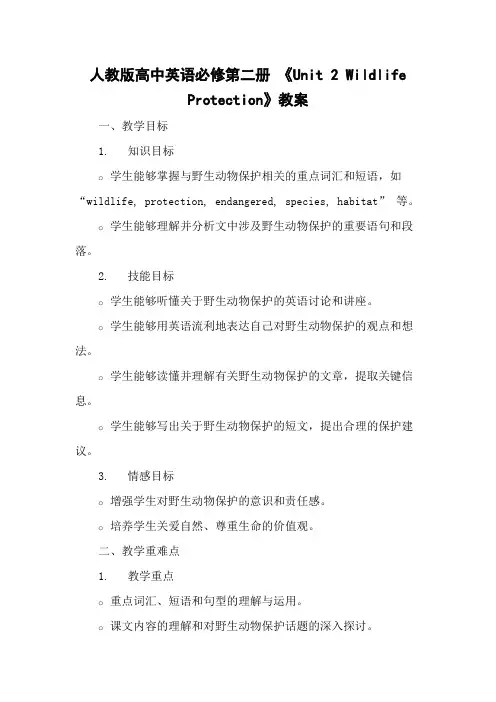
人教版高中英语必修第二册 《Unit 2 WildlifeProtection》教案一、教学目标1.知识目标o学生能够掌握与野生动物保护相关的重点词汇和短语,如 “wildlife, protection, endangered, species, habitat” 等。
o学生能够理解并分析文中涉及野生动物保护的重要语句和段落。
2.技能目标o学生能够听懂关于野生动物保护的英语讨论和讲座。
o学生能够用英语流利地表达自己对野生动物保护的观点和想法。
o学生能够读懂并理解有关野生动物保护的文章,提取关键信息。
o学生能够写出关于野生动物保护的短文,提出合理的保护建议。
3.情感目标o增强学生对野生动物保护的意识和责任感。
o培养学生关爱自然、尊重生命的价值观。
二、教学重难点1.教学重点o重点词汇、短语和句型的理解与运用。
o课文内容的理解和对野生动物保护话题的深入探讨。
2.教学难点o如何引导学生用英语准确、流畅地表达对野生动物保护的复杂观点。
o帮助学生理解一些较难的专业术语和长难句。
三、教学方法1.任务型教学法:通过布置各种任务,引导学生在完成任务的过程中学习和运用知识。
2.讨论式教学法:组织学生进行小组或全班讨论,激发学生的思维和表达能力。
3.多媒体辅助教学法:利用图片、视频等多媒体资源,增强教学的直观性和趣味性。
四、教学过程(一)导入(5 分钟)1.播放一段有关野生动物的精彩视频,展示野生动物的美丽和多样性。
2.提问学生:What did you see in the video? Why do we need to protect wildlife?(二)词汇和短语学习(10 分钟)1.展示本单元的重点词汇和短语,结合图片和例句进行讲解。
2.进行词汇小测试,如单词拼写、词义匹配等,检查学生的掌握情况。
(三)阅读前准备(5 分钟)1.让学生看课文标题和图片,预测文章内容。
2.提出一些引导性问题,如:What might be the problems faced by wildlife? How can we protect them?(四)课文阅读(15 分钟)1.学生快速阅读课文,概括文章主旨。
个性化教学设计教案授课时间: 2022 年 05 月 26 日备课时间: 2022 年 06 月 01 日年级:高二学科:英语课时: 2 学生姓名:课题名称高中英语必修 2 Unit 2 单元复习授课教师:1. 复习和掌握重要词汇和词组,并其用法,如ancient, compete, magical, volunteer, regular, basis, admitnowadays, host, responsibility, replace, swift, charge, bargain, deserve 等; take part in, stand for, used to do, a setof, every four years, promise to do sth, as well, as...as..., get/be married (to sb.), make a bargain with sb 等2. 复习和巩固普通将来时态的被动语态: 主语+shall / will + be done教学目标3. 复习和应用重要句型,强调句型:It is...that...倒装句:nor / neither+系动词/助动词/情态动词+主语。
并列句:not only...but (also)... 意为“不仅……而且……”教学重点教学难点1. 准确地朗读并熟记重要词汇和短语。
2. 正确地将普通将来时态的主动语态与普通将来时态的被动语态进行相互转换。
3. 灵便地应用重要句型。
Step 1: 回顾旧知。
1. 听写必修2 Unit 1 重要词汇和词组2. 核对并讲解作业。
Step 2:讲解An interview 和The story of Atlanta 的重要知识点1. How many countries competed in the ancient Olympic Games?compete vi. 比赛;竞争compete in...在... 中竞争/参加... compete for...为...而竞争compete with/against... 与...竞争How many runners will be competing in the marathon?有多少运动员参加马拉松赛跑?The two teams compete for the championship. 那两队要争当冠军。
Unit 2 The Olympic GamesPeriod 4 Language points 教学设计I. Teaching contents:Learning about languageII. Teaching aims:1)Develop the students’ spirits of cooperation and teamwork.2). Grasp the usage of such important expressions :interview; find out ; allow; charge; take the place of ;3). Master the sentence pattern:①It’s …that…为强调句型,②not only A, but (also)B 不但……而③Nor / Neither + 助动词+主语…④as+adj.+不可数名词+asIII. Key points & DifficultiesKey points:How to use the phrases correctly.Teaching Difficulties:How can students use the sentence pattern freely.IV. Teaching procedure:Step 1: Words review.Ask several students to finish the blanks on PPT 3-4Step 2: Difficulties and key sentences explaination appeared in the text.1. interview (n./v.) 采访, 会见, 面试interviewer (采访者)interviewee (被采访者)2. find out 查明,弄清情况find sb. out 查处(坏人);识破3. It+be +被强调部分+that/who+句子其余部分。
Unit 2 The Olympic Games I. 单元教学目标II. 目标语言III. 教材分析和教材重组1. 教材分析本单元以Olympic Games 为话题,旨在通过本单元教学,使学生了解奥运会的起源、宗旨、古代奥运会与现代奥运会的区别和相似之处以及比赛项目。
同时培养学生对体育运动的爱好。
在口语表达中,要求学生学会询问别人的兴趣爱好,以及如何向别人推荐自己的某一种爱好。
1.1 Warming Up通过对关于Olympic Games 的8个问题的提问,让学生根据对奥运知识的了解回答问题,目的在于激活同学们所了解的奥运知识,激发学生学习本单元的兴趣。
1.2 Pre-Reading通过学生对三个问题的讨论与交流,使他们了解奥运会有关知识。
1.3 Reading通过古希腊的一位作家到现代社会采访一位中国女孩的方式,介绍奥运会的有关知识,也让学生们了解了古代奥运会和现代奥运会的异同。
1.4 Comprehending是利用表格和问题的形式对文章进行分析,要求同学们找出古代与现代奥运会的异同点以及对文章内容细节的理解。
1.5 Learning about Language分词汇和语法两部分。
第一部分Discovering useful words and expressions 中的第一个练习,根据课文的上下语境的理解词意,写出英文解释所对应的单词。
第二个练习是要求同学们通过熟悉的近义词或短语来掌握课文中出现的新的词和短语。
第三个练习则是一篇小短文,要求同学们用所给的单词的正确形式填空。
第二部分Discovering useful structures则通过3 个练习来巩固同学们对将来时态的被动语态使用。
1.6 Using Language分为Reading and Listening,Speaking and Writing两部分。
Reading “The story of Atlanta”是一篇古希腊的故事。
人教英语必修二Unit 2 Wildlife protection 微课教学+课件教案下载↓Unit 2 单词朗读:Unit 2 课文朗读:视频教学:重点单词:重点句型:1.put up a poster 张贴海报2.legal adj 合法的 illegal adj. 不合法的3.hunt for 猎取(食物,皮毛),寻找某人4.at an alarming rate 以一种惊人的速度5.alarm clock 闹钟I set the alarm clock for 7 o\\\'clock.我把闹钟设定到7点6.in the danger of extinction 濒临灭绝7.mass of 大量的8.be aware of 意识到awareness n. 意识raise people\\\'s awareness of protecting wildlife 提高人们保护动植物的意识9.endangered adj. 灭绝的,遭受危险的endangered animals 濒临灭绝的动物10.be concerned about 对。
关心的11.earn one\\\'s living 谋生12.take effective measures 采取有效措施take actions 采取行动13.make a reservation 预定make a reservation for two tables预定两个位子14.on the plain 在平原上15.make out 看清,听清make up 化妆,编造,构成make it 成功make up for 弥补16.observe v.观察,遵守(规则),庆祝(节日)17.remind sb of sb/sth 提醒某人想起某人或某物remind sb (not) to do sth 提醒某人(不要)做某事18.shoot at 朝。
必修二unit2教案教案标题:必修二Unit 2: Growing Pains教案目标:1. 帮助学生了解和掌握本单元的核心词汇和短语。
2. 培养学生在听、说、读、写各方面的语言技能。
3. 引导学生探索和思考青少年成长中的问题和困惑。
4. 促进学生的团队合作和交流能力。
教学重点:1. 重点词汇和短语的掌握和运用。
2. 阅读和听力技能的提升。
3. 学生对青少年成长问题的思考和表达能力的培养。
教学难点:1. 如何引导学生深入思考和讨论青少年成长问题。
2. 如何提高学生的听力技能和阅读理解能力。
教学准备:1. PowerPoint幻灯片,包含本单元的词汇和短语。
2. 学生练习册和课本。
3. 音频材料和听力练习题。
4. 分组活动所需的材料。
教学过程:Step 1: 导入(5分钟)通过展示幻灯片介绍本单元的主题和目标,引起学生的兴趣和思考。
Step 2: 词汇和短语学习(15分钟)使用幻灯片呈现本单元的核心词汇和短语,并进行解释和示范。
然后,进行词汇练习,包括单词拼写、词义选择等。
Step 3: 听力训练(20分钟)播放相关的听力材料,让学生进行听力理解和填空练习。
随后,进行听力答案的讨论和解析。
Step 4: 阅读理解(20分钟)学生阅读课本中与本单元相关的文章,并回答相关的问题。
教师可以提供适当的指导和解读。
然后,学生可以进行小组讨论,分享彼此的答案和观点。
Step 5: 讨论和表达(15分钟)教师引导学生讨论青少年成长中的问题和困惑,并鼓励学生表达自己的观点和经验。
可以采用小组讨论或全班讨论的形式。
Step 6: 小结和作业布置(5分钟)教师对本节课进行小结,并布置相关的作业,如完成练习册的相关练习、写一篇关于青少年成长问题的短文等。
教学延伸:1. 邀请一位青少年成长问题的专家或家长来进行讲座或座谈,让学生更深入地了解和思考这个话题。
2. 组织学生进行小组或个人项目,调查和研究青少年成长问题,并展示他们的发现和观点。
compete for 争取获得compete with /against 同……竞争2.take part in 参加,参与Take an active part inPlay an important part in 扮演重要角色take part in,join ,join in ,attend :take part in 指参加大型活动,join指参加党派,团体,组织等,表示成为其中一员。
与某人一起做某事可以表达为:join sb. in (doing) sth. join in指参加某种活动,游戏,竞赛,娱乐。
attend 指参加会议,婚礼,典礼,上课,上学,听报告等。
3.stand for 代表,象征,表示; 主张,拥护,支持;忍受Stand up 站起来stand out 突出,显眼stand by 袖手旁观stand aside 站在一旁4.admit 准许进入,准许参加,接纳,承认be admitted to/into 被准许进入admit doing/that…承认做了……admit sb./sth. to be /as…承认某人/某物是…5.nor/neither 也不倒装结构nor/neither +助动词/be/情态动词+主语表示某人某物也不……类似于so的用法So+主语+助动词/be/情态动词表示某人某物的确……6.as well 也,又,还as well as 和……一样might/may as well do 我们不妨/还是…吧besides ,in addition to 除……之外还有as well,also,too,either 的区别as well前面不用逗号,放在句尾,用在肯定句,疑问句中also 一般放在be/情态动词/助动词之后,实义动词之前too放在句中或句末,通常用逗号隔开,用于肯定句,疑问句中。
Either 放在句尾7.as…as和……一样第一个as为副词,第二个as为连词,用来连接一个比较状语从句,但常省略与主句相同的成分。
原文再现:There is as much competition among counties to host the Olympics as to win Olympic medals.国与国之间争取奥运会承办权的竞争就跟夺奥运奖牌一样激烈。
As….as 运用形式:(倍数times)1).as+adj/adv+as…2).as+adj+可数名词复数或不可数名词+as…3).as+adj+a/an+可数名词单数+as…German is just as difficult to learn as English.You must give flowers as much water as they need.The room is four times as large as ours.8.replace 取代,替换,把……放回原处ReplacementReplaceableReplace sth.Replace…with/by..用…代替Take the place of代替In place of sb./sth.=in sb.’s/sth.’s place 代替In place 在适当的位置Out of place 不适合的,在不适当的位置With everything in place,she started the slide show.一切就绪,她开始播放幻灯片Replace soda with water.用水取代苏打。
It would be difficult to find a man to take the place of the present manager.找一个人来代替现在的经理是不容易的。
9.charge vt&vi收费,控诉,充电n.费用,主管Charge…for…索价,要价Charge sb. with sth.=accuse sb. of wth. 指控某人In charge of sth.负责、主管某事In the charge of sb. 由某人负责Take charge of 负责,主管Free of charge 免费Charge a battery 给电池充电Cost,charge,price,fee,fare的区别Cost指生产某东西的成本,代价Charge 指商品或服务所需的费用Price 指商品在市场上出售时的价格,尤指商品的单价Fee指上学、求医、找律师收取的费用Fare 侧重旅行时所付的车费,船费(交通费用)What did they charge for the repairs? 他们收了多少维修费用The house in the downtown cost him 3 million yuan. 市中心的房子花了他300万元。
Airplane fares have gone up again. 飞机票又涨价了。
I won’t buy that type of car at that price. 我不会以那个价格买那种类型的车。
Who paid the fee for hosting the party、谁出的钱举办聚会?10.as 在定语从句中可以充当主语、宾语和表语,经常和such ,so ,the same 连用,当先行词被such,so,the same 修饰时,关系代词用as.短语the same…as 指同一类the same…that 指同一物Your have such a beautiful dress as I bought yesterday.You have the same dress as I bought yesterday.This is the same dictionary as I bought .(这和我昨天买的词典一样)11.advertise vt&vi做广告,登广告Advertise sth.登广告宣传某物Advertisement 广告Advertise for 公布,招聘We should advertise for someone to look afer the garden.If you want to sell your goods, you had better put an advertisement on TV.12.instruction n.指示,命令,说明,教授Instruct v.指示,命令instructor 教练instruct sb. to do sth.命令某人做事Instruct that…指示…Instructions, explanation, introduction区别Instructions 表示用法说明,操作指南Explanation 指解释,对别人的口头说明,诠释Introduction 指对用途和人物的介绍He gave us instructions to finish this matter as soon as possible.他指示我们尽快完成这件事情。
三.课堂练习单项填空1. ---Would you like to _________ us in celebrating John’s return from America tonight?--- I’d like to, but I have to _________ a meeting.join; attend B. attend; join C. take part in; attend D. join; join in2. In my opinion, life in the twenty-first century is much easier than .A. that used to beB. what it is used toC. what it was used toD. what it used to be3. Why not try your luck downtown, Bob? That’s the best jobs are.A. whereB. whatC. whenD. why4. John as well as his brothers, to the party.A. have goneB. had goneC. has goneD. go5. It wasn’t until nearly a month later I received th manager’s reply.A. sinceB. whenC. asD. that6. After two hours of swimming, Smith and John came to was called Bird-island.A. the place whereB. the place whatC. whatD. that7. She reached the top of the hill and stopped on a big rock by the side of the path.A. to have restedB. restingC. to restD. rest8. It is generally believed that teaching is it is a science.A. as art much asB. much an art asC. as an art much asD. as much an art as。